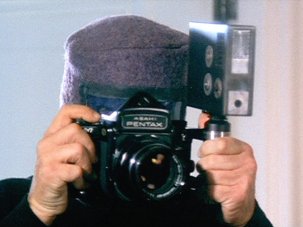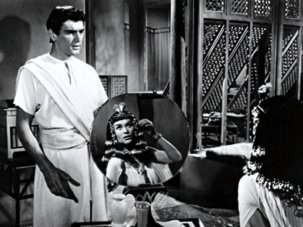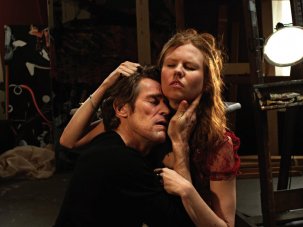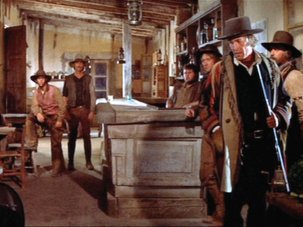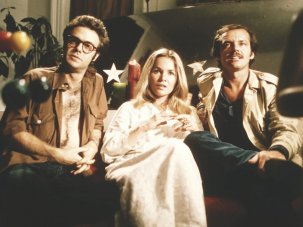from our June 2013 issue
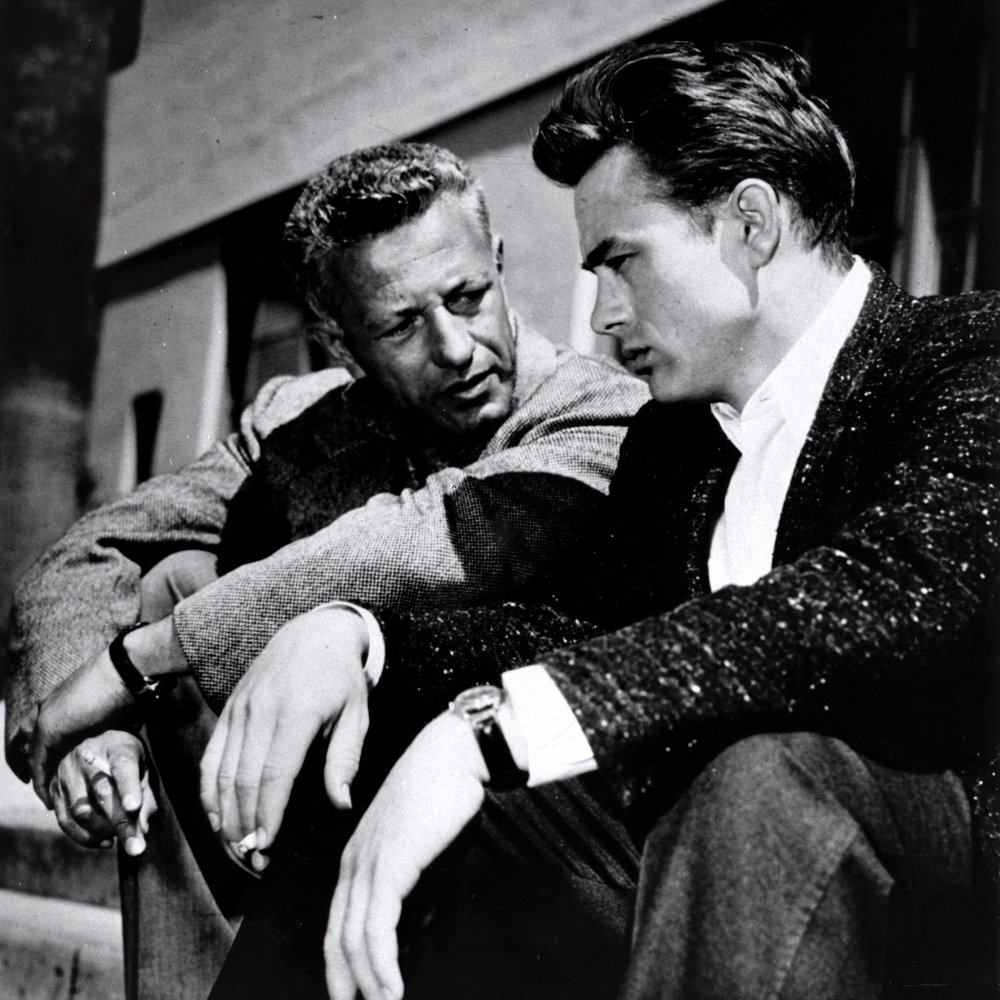
Nicholas Ray and James Dean on the set of Rebel without a Cause (1955)
In the mid-1980s, aspiring auteurists without easy access to London’s repertory cinemas had far more opportunities to read articles about Nicholas Ray than to see his work. Prior to BBC2’s Ray season in 1986, these films rarely played on television and few were available on video: The Lusty Men (1952) was apparently released in 1981 by a company called ‘21st Century’ but I never managed to track it down; a double bill of Flying Leathernecks (1951) and Fritz Lang’s Beyond a Reasonable Doubt (1956) supposedly disseminated by Kingston proved similarly inaccessible (come to think of it, I don’t recall seeing any of Kingston’s mouth-watering double-bills in an actual shop); transfers of Rebel Without a Cause (1955) and 55 Days at Peking (1963) issued respectively by Warners and Intervision were so badly panned-and-scanned as to be unwatchable.
So my introduction to Ray came in the form of a tape found in the porn section of a local video store: Dreams of Thirteen. This turned out to be a retitling of Wet Dreams (Rêves humides, 1974), a portmanteau feature produced by Max Fischer (like Ray, a friend of Henri Langlois), who asked several filmmakers – including writer Heathcote Williams (whose play The Local Stigmatic would later be filmed by Al Pacino) and a pseudonymous Dusan Makavejev – to shoot their erotic fantasies.
The BBFC cut an entire episode, Falcon Stuart’s Necrophiliacs, from the version shown in UK cinemas (rendering the new title, which ostensibly referred to the number of directors involved rather than the age of the naked girl on the poster, doubly misleading), and this truncated edition was subsequently distributed on VHS and Betamax by ‘World of Video 2000’ in 1979, making it one of the first films to be released on video anywhere. Amusingly, the packaging claims that Dreams of Thirteen was financed by a “German multi-millionaire”, and identifies Nicholas Ray as the person who discovered James Dean and directed East of Eden!
Ray’s 12-minute segment ‘The Janitor’ (itself slightly trimmed by the BBFC) was improvised in Fischer’s Amsterdam studio over the course of a few days in 1973, with the director playing both lead roles: a priest who denounces Moses’s Ten Commandments before overseeing an orgy during which he is fellated by several young women (one of whom may be his daughter), and the eponymous janitor, who exists in his own separate corner of the narrative, agonising over the priest’s activities and finally setting fire to a screen upon which his doppelgänger’s image is being projected. Ray staged much of this as a theatrical ‘happening’, leaving Fischer, who was the main cameraman, to cover the unpredictable action as if he were shooting documentary footage.
Reviewing Dreams of Thirteen for the April 1977 Monthly Film Bulletin, Peter Markham described Ray’s episode as an “ineffectual attempt at Absurdist profundity, embarrassing in its narcissism”, while Bernard Eisenschitz, in Nicholas Ray: An American Journey, claims: “One probably has to be very involved with Ray’s films or with his personal evolution to appreciate ‘The Janitor’ as anything more than a crude sketch.”
I knew little about Ray when I first saw this short yet was immediately struck by how accurately it caught the elusive quality of a dream, taking place in a series of rooms whose function as abstract dream-spaces is perversely strengthened by their solidity: there seems to be no geographical relationship between the studio being swept by the janitor and the church where the priest addresses his congregation yet these locations keep bleeding into each other (the janitor finds the priest’s hat as well as the ruby ring he claims to have lost), reflecting the split nature of Ray’s doubled protagonist.
‘The Janitor’ has long been one of the most difficult Ray films to see (transfers circulating via the internet, including YouTube, were derived from a French-dubbed edition), which makes it more than a little ironic that it should have provided my entree into Ray’s universe, becoming the prism through which I would experience the rest of his oeuvre. In its focus on the moralistic janitor’s opposition to a libidinal priest (the patriarchal authority figure and working-class employee reversing their usual symbolic roles), ‘The Janitor’ has a great deal in common with Ray’s earlier films, which frequently depicted struggles between superego and id figures: Emma (Mercedes McCambridge) and the Dancin’ Kid (Scott Brady) in Johnny Guitar (1954), Leith (Richard Burton) and Brand (Curd Jürgens) in Bitter Victory (1957), Walt Murdock (Christopher Plummer) and Cottonmouth (Burl Ives) in Wind Across the Everglades (1958), Thomas Farrell (Robert Taylor) and Rico Angelo (Lee J. Cobb) in Party Girl (1958), Inuk (Anthony Quinn) and Peter O’Toole’s nameless trooper in The Savage Innocents (1960), Christ (Jeffrey Hunter) and Barabbas (Harry Guardino) in King of Kings (1961). Bigger Than Life (1956) located this conflict within a single personality.
By playing both parts himself in what would be his last completed work, Ray confirmed just how personal his Hollywood movies were, revealing the extent to which the struggle they depict was an internal one. ‘The Janitor’ creates an atmosphere of sexual guilt that is both specific and generalised, and stands alongside Rebel Without a Cause as perhaps the clearest cinematic expression of its auteur’s bisexuality: it begins with the janitor mentioning (in voiceover) how he once heard that “at an international convention of psychoanalysts in Amsterdam one day, the entire discussion was about how each one present had his fantasy about sucking his own cock. I thought it was very indecent.” Even the janitor’s broom is suggestive of sexual confusion (or ambivalence), its owner initially stroking the rigid ‘phallus’ at one end, then caressing the hairy appendage at the other.
Happily, a good-quality transfer of ‘The Janitor’ was included as an extra on Osciloscope’s region-free US DVD/Blu-ray of Ray’s We Can’t Go Home Again (1973). Though that disc’s main feature has understandably been garnering more attention, the availability of ‘The Janitor’, rescued from its rather ignoble context and finally viewable both uncut and in English, is among the more welcome events of recent cinephile history.
-
Sight & Sound: the June 2013 issue

Neil Jordan’s vampire return Byzantium, Audrey Tatou in Therese Desqueyroux, Joachim Lafosse’s Our Children, Olivier Assayas’s...






